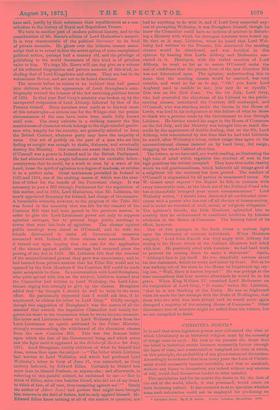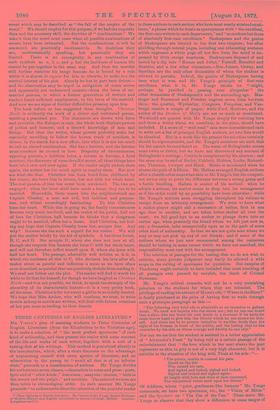CHRISTINA NORTH.* Fr is said that some ingenious person once
calculated the time at which Christianity as an historical religion must by the necessity of things cease to exist. He took as his premiss the thesis that- the belief in historical events becomes necessarily fainter through the lapse of time, and constructed or imagined the ratio at which, on this principle, the probability of any given statement diminishes. Accordingly he reckoned that in so many years the facts of Christi- anity would necessarily became incredible, and that so mankind, without any blame to themselves, and indeed without any exercise of will, would find themselves landed in utter unbelief.
This speculation had for its motive the desire to fix the date of the end of the world, which, it was presumed, would ensue on faith becoming extinct. It has occurred to us to speculate whether some such calculation could not be employed for predicting an
• (Aria:too North. By B. M. Arch, 2 vols. London: Macmillan. 1812. 'event which may be described as "the fall of the empire of the novel." We should employ for this purpose, if we had the requisite data and the necessary skill, the doctrine of "combinations." We take it that the novel must cease when all possible combinations of events have been exhausted. But the combinations, it will be answered, are practically inexhaustible. So doubtless they -are, mathematically speaking, but practically they are limited. There is no incongruity in any combination of -such symbols as a, I), x, and y, but the incidents of human life 'cannot be put together in the same way. And then the novelist etill further restricts his range because he is bound by a rule which it is almost de rigueur for him to observe, to make love the central interest of his plot. Already he has in part been driven— and the observation may be urged in mitigation of much severe and apparently not undeserved censure—from the loves of un- married persons, in which a former generation of writers and readers found sufficient employment, to the loves of the married. And now we see signs of further difficulties pressing upon him.
The book before us has suggested these thoughts. Christina North is evidently the work of a clever and cultivated person, wielding a practised pen. The characters are drawn with force and precision, the dialogue is easy, the whole book displays powers of pathos and humour, and a shrewd knowledge of men and things. But then the writer, whose powers probably make her especially unwilling to follow the beaten track of novelists, is driven, in the search for a new effect, into what it is not too much to call an absurd combination. She has a heroine, and the heroine must somehow be crossed in love. Disparity of circumstances, opposing parents, a faithless lover, a reverse in fortune, a fatal accident, the discovery of some dreadful secret, all these things have been tried over and over again. If the reader might endure them again, the author has too much spirit to employ them. But now eee what she does. Christina has been loved from childhood by her cousin, she loves him in return, but not with her whole heart. The real passion of that has never been awakened. The two are 'engaged; when the lover shall have made a home, they are to be married. Meanwhile, there comes into the neighbourhood one Captain Cleaeby, a man not evil, but indolent and purpose- less, and withal exceedingly fascinating. To him Christina loses her heart. While this is going on, the family circumstances become very much involved, and the rector of the parish, half out of love for Christina, half because he thinks that a clergyman ought to be married, offers her a home. And Christina, not feel- ing any hope that Captain Cleasby loves her, accepts him. And 'why? Because she has such a regard for her cousin! We will put the matter briefly by the aid of symbols. A has three lovers, B, C, and D. She accepts D, whom she does not love at all, though she respects him because she loves C with her whole heart, and will not therefore inflict herself upon B, whom she loves with half her heart. The passage, admirably well written as it is, in which she confesses all this to C, who declares his love after all, makes about as painful and ludicrous a scene as we have often zeen described, so painful that one positively shrinks from reading it. We shall not follow out the plot. The reader will find it worth his while to do that for himself, for though we have laughed at Christina North—and it is not possible, we think, to speak too strongly of the absurdity of its characteristic feature—it is a very pretty book, all the same. Christina is far too sweet a girl to be so cruelly treated. We hope that Miss Archer, who will continue, we trust, to write covels as long as novels are written, will deal with future creations of her pen more according to their deserts.



































 Previous page
Previous page